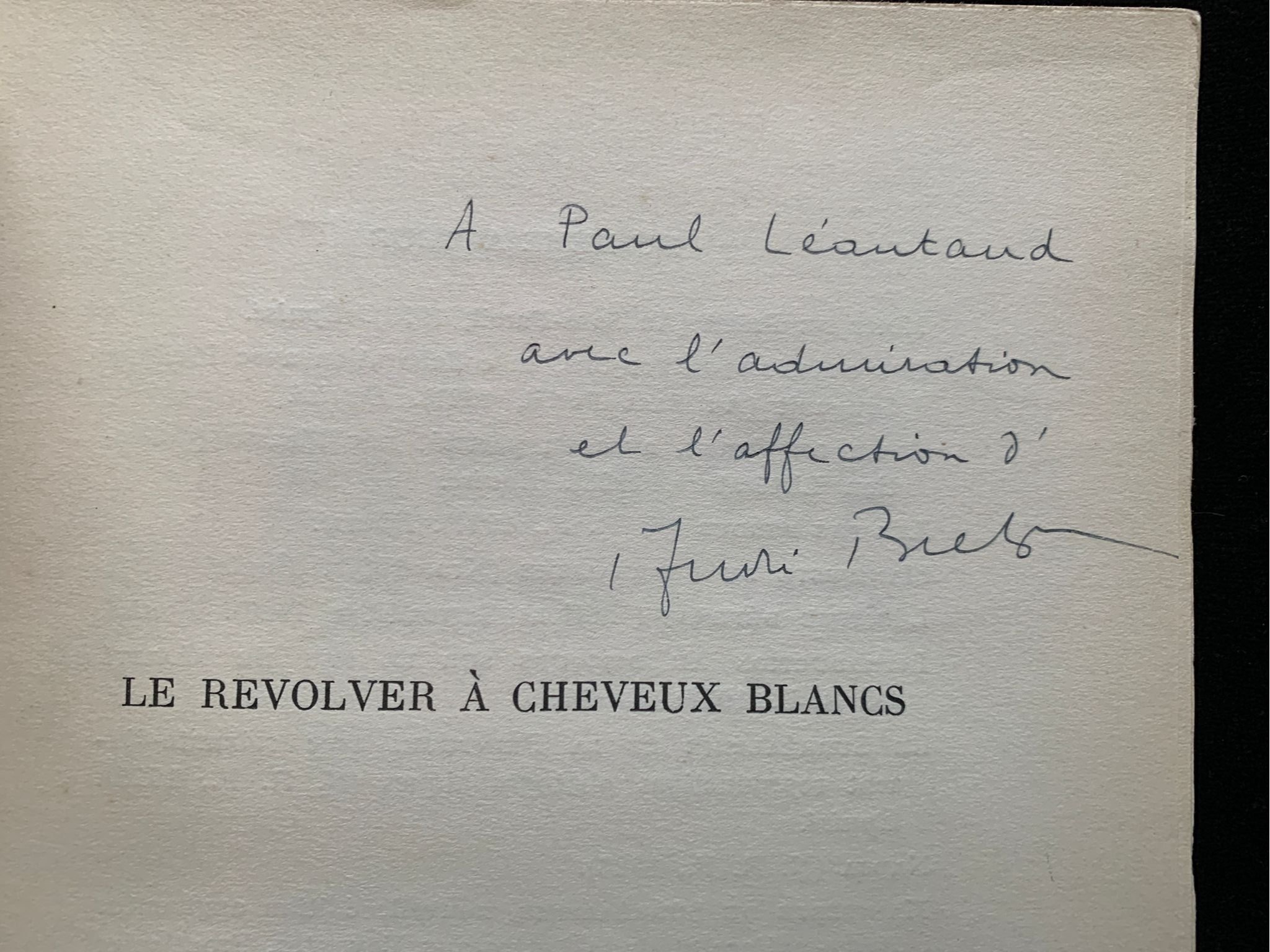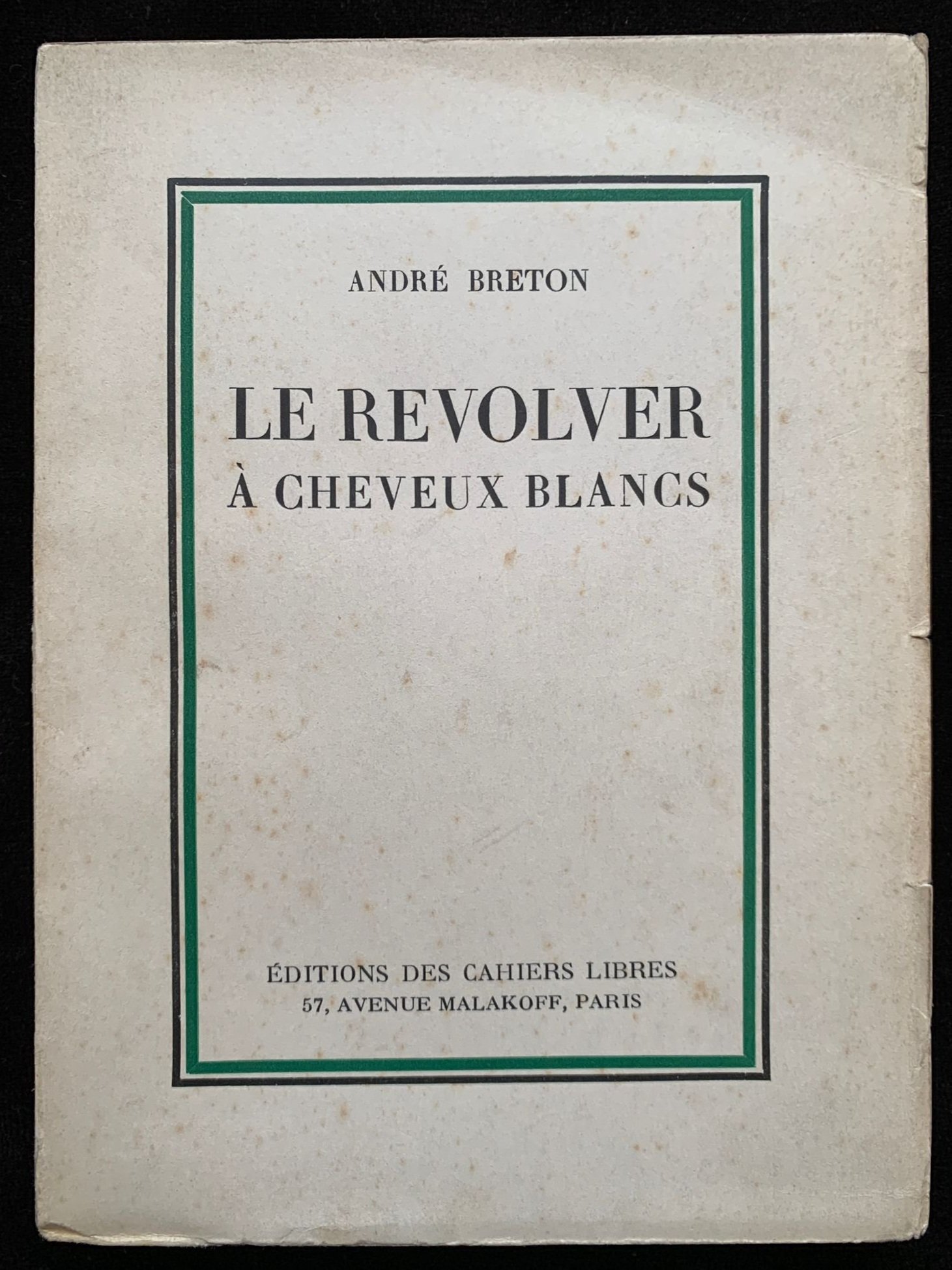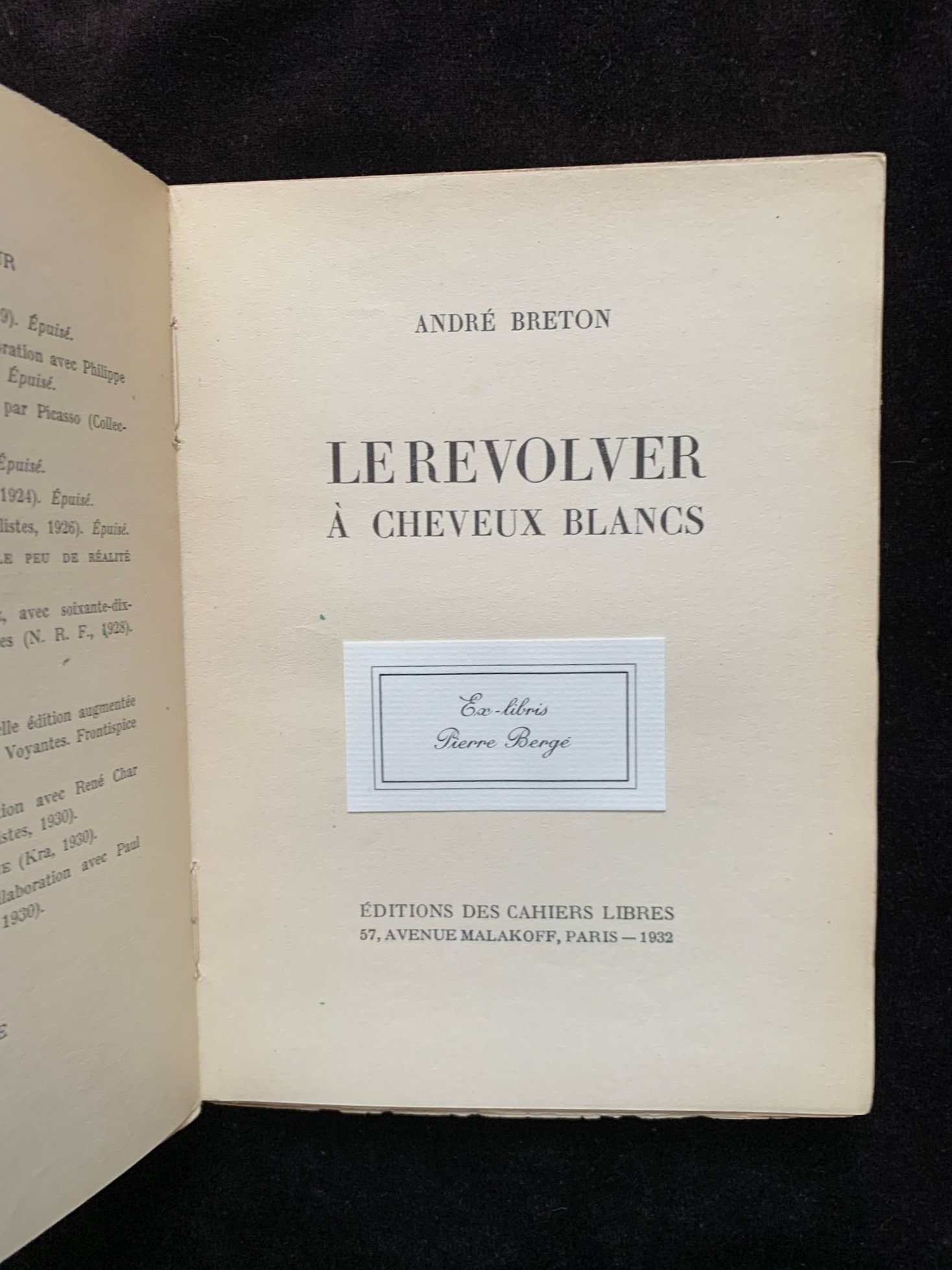 Image 1 of 3
Image 1 of 3

 Image 2 of 3
Image 2 of 3

 Image 3 of 3
Image 3 of 3




Le Revolver á Cheveux Blancs
BRETON, André.
Le Revolver á Cheveux Blancs.
Paris: Éditions des Cahiers Libres, 1932.
8vo. (195 x 145 mm.). Publisher's paper wrappers. Inscribed by Breton to the literary critic Paul Léautaud in a neat hand on the half-title, unopened. A little very light spotting to covers and the occasional crease (one more obvious to upper right-hand corner of upper cover), internally clean, a very good and clean copy in glassine wrappers and a quarter blue shagreen gilt slipcase by Boichot. Provenance: Paul Léautaud (inscription from Breton); Pierre Bergé, his ex libris loosely inserted (and his sale, Paris).
First edition, an unnumbered service de presse [advance] copy warmly INSCRIBED TO NOTED LITERARY CRITIC PAUL LÉAUTAUD AND FROM THE COLLECTION OF PIERRE BERGÉ. The 'White-haired Revolver' was a line from an unpublished automatic text of 1924, and the collection includes one of Breton's most famous poems, l'Union Libre (or Free Union), written in the style of a Renaissance blason, in memory of his former lover Suzanne Muzard. It also incorporates a preface by Breton, a short theoretical text in ('Once Upon a Time to Come'), in which he defines "the imaginary" as "what tends to become real."
Published on 25 June 1932 in 1,010 copies, with 10 deluxe copies illustrated by Salvador Dalí, this is an un-numbered advance copy. The recently-founded Éditions des Cahiers Libres was the brainchild of the poet René Laporte, and at the same time as producing this book, he produced two more Surrealist works: La Vie Immédiate by Paul Eluard (to whom Le Revolver was dedicated) and Tristan Tzara's Oú Boivent Les Loups. Breton contributed 1,000 Francs to the printing costs.
Paul Léautaud was an eccentric and misanthropic literary critic whose 'JournalLittéraire' is nonetheless an "invaluable document on Parisian literary life" ranging from 1893 to 1956, and his writing has been praised for its honesty and integrity (although Cocteau called him "a clown...but a witty one.)" Léautaud made an impression on this side of the Channel, too: Graham Greene wrote of his fiction that "[h]e has taken for his own a particular area of human life and no one is his rival there. It was the same area that Toulouse-Lautrec painted: the bars and brothels of Montmartre...He...'judges not as a judge judges': he only notices with the clear curious impartial eye of a child", while Nancy Mitford mentions him in a 1951 letter to Evelyn Waugh, noting a radio interview in which Léautaud declared that he loved cats and dogs above humans, that he had lived on nothing but cheese for eight years, and that he had never travelled further than Calais.
In his journal entry for the 4th July 1932 (Journal littéraire, vol. IX), Léautaud notes: "Je suis depuis longtemps trés en faveur auprés des Surréalistes, dont je ne connais guére que André Breton...Je reçois tous leurs tracts, leur manifestes, leurs polémiques...Aujourd'hui, d'un coup, trois volumes de vers, de Tristan Tzara, de André Breton, et de Paul Éluard." (I have for some time been very much in favour of the Surrealists, though I only really know André Breton...I get all their tracts, manifestoes, and polemics...Today, all together, three volumes of verse, by Tristan Tzara, André Breton, and Paul Éluard). It is almost certainly this copy to which he refers, and it seems probable that the three Surrealist works published together by the Éditions de Cahiers Libres were sent to him together, this one bearing an inscription from André Breton. Pierre Bergé was the noted industrialist, collector and partner of the fashion designer Yves Saint Laurent.
Edition originale, exemplaire service de presse avec un envoi autographe d'André Breton á Paul Léautaud, auteur de son Journal littéraire, oú il note l'arrivé de (sans doute) cette exemplaire le 4 juillet 1932. De la collection de Pierre Bergé.
This collection contains Breton's most celebrated poem, L'Union Libre. Paul Léautaud was a noted, if somewhat cantankerous, critic for the Mercure de France.
Sheringham Aa 195.
BRETON, André.
Le Revolver á Cheveux Blancs.
Paris: Éditions des Cahiers Libres, 1932.
8vo. (195 x 145 mm.). Publisher's paper wrappers. Inscribed by Breton to the literary critic Paul Léautaud in a neat hand on the half-title, unopened. A little very light spotting to covers and the occasional crease (one more obvious to upper right-hand corner of upper cover), internally clean, a very good and clean copy in glassine wrappers and a quarter blue shagreen gilt slipcase by Boichot. Provenance: Paul Léautaud (inscription from Breton); Pierre Bergé, his ex libris loosely inserted (and his sale, Paris).
First edition, an unnumbered service de presse [advance] copy warmly INSCRIBED TO NOTED LITERARY CRITIC PAUL LÉAUTAUD AND FROM THE COLLECTION OF PIERRE BERGÉ. The 'White-haired Revolver' was a line from an unpublished automatic text of 1924, and the collection includes one of Breton's most famous poems, l'Union Libre (or Free Union), written in the style of a Renaissance blason, in memory of his former lover Suzanne Muzard. It also incorporates a preface by Breton, a short theoretical text in ('Once Upon a Time to Come'), in which he defines "the imaginary" as "what tends to become real."
Published on 25 June 1932 in 1,010 copies, with 10 deluxe copies illustrated by Salvador Dalí, this is an un-numbered advance copy. The recently-founded Éditions des Cahiers Libres was the brainchild of the poet René Laporte, and at the same time as producing this book, he produced two more Surrealist works: La Vie Immédiate by Paul Eluard (to whom Le Revolver was dedicated) and Tristan Tzara's Oú Boivent Les Loups. Breton contributed 1,000 Francs to the printing costs.
Paul Léautaud was an eccentric and misanthropic literary critic whose 'JournalLittéraire' is nonetheless an "invaluable document on Parisian literary life" ranging from 1893 to 1956, and his writing has been praised for its honesty and integrity (although Cocteau called him "a clown...but a witty one.)" Léautaud made an impression on this side of the Channel, too: Graham Greene wrote of his fiction that "[h]e has taken for his own a particular area of human life and no one is his rival there. It was the same area that Toulouse-Lautrec painted: the bars and brothels of Montmartre...He...'judges not as a judge judges': he only notices with the clear curious impartial eye of a child", while Nancy Mitford mentions him in a 1951 letter to Evelyn Waugh, noting a radio interview in which Léautaud declared that he loved cats and dogs above humans, that he had lived on nothing but cheese for eight years, and that he had never travelled further than Calais.
In his journal entry for the 4th July 1932 (Journal littéraire, vol. IX), Léautaud notes: "Je suis depuis longtemps trés en faveur auprés des Surréalistes, dont je ne connais guére que André Breton...Je reçois tous leurs tracts, leur manifestes, leurs polémiques...Aujourd'hui, d'un coup, trois volumes de vers, de Tristan Tzara, de André Breton, et de Paul Éluard." (I have for some time been very much in favour of the Surrealists, though I only really know André Breton...I get all their tracts, manifestoes, and polemics...Today, all together, three volumes of verse, by Tristan Tzara, André Breton, and Paul Éluard). It is almost certainly this copy to which he refers, and it seems probable that the three Surrealist works published together by the Éditions de Cahiers Libres were sent to him together, this one bearing an inscription from André Breton. Pierre Bergé was the noted industrialist, collector and partner of the fashion designer Yves Saint Laurent.
Edition originale, exemplaire service de presse avec un envoi autographe d'André Breton á Paul Léautaud, auteur de son Journal littéraire, oú il note l'arrivé de (sans doute) cette exemplaire le 4 juillet 1932. De la collection de Pierre Bergé.
This collection contains Breton's most celebrated poem, L'Union Libre. Paul Léautaud was a noted, if somewhat cantankerous, critic for the Mercure de France.
Sheringham Aa 195.
BRETON, André.
Le Revolver á Cheveux Blancs.
Paris: Éditions des Cahiers Libres, 1932.
8vo. (195 x 145 mm.). Publisher's paper wrappers. Inscribed by Breton to the literary critic Paul Léautaud in a neat hand on the half-title, unopened. A little very light spotting to covers and the occasional crease (one more obvious to upper right-hand corner of upper cover), internally clean, a very good and clean copy in glassine wrappers and a quarter blue shagreen gilt slipcase by Boichot. Provenance: Paul Léautaud (inscription from Breton); Pierre Bergé, his ex libris loosely inserted (and his sale, Paris).
First edition, an unnumbered service de presse [advance] copy warmly INSCRIBED TO NOTED LITERARY CRITIC PAUL LÉAUTAUD AND FROM THE COLLECTION OF PIERRE BERGÉ. The 'White-haired Revolver' was a line from an unpublished automatic text of 1924, and the collection includes one of Breton's most famous poems, l'Union Libre (or Free Union), written in the style of a Renaissance blason, in memory of his former lover Suzanne Muzard. It also incorporates a preface by Breton, a short theoretical text in ('Once Upon a Time to Come'), in which he defines "the imaginary" as "what tends to become real."
Published on 25 June 1932 in 1,010 copies, with 10 deluxe copies illustrated by Salvador Dalí, this is an un-numbered advance copy. The recently-founded Éditions des Cahiers Libres was the brainchild of the poet René Laporte, and at the same time as producing this book, he produced two more Surrealist works: La Vie Immédiate by Paul Eluard (to whom Le Revolver was dedicated) and Tristan Tzara's Oú Boivent Les Loups. Breton contributed 1,000 Francs to the printing costs.
Paul Léautaud was an eccentric and misanthropic literary critic whose 'JournalLittéraire' is nonetheless an "invaluable document on Parisian literary life" ranging from 1893 to 1956, and his writing has been praised for its honesty and integrity (although Cocteau called him "a clown...but a witty one.)" Léautaud made an impression on this side of the Channel, too: Graham Greene wrote of his fiction that "[h]e has taken for his own a particular area of human life and no one is his rival there. It was the same area that Toulouse-Lautrec painted: the bars and brothels of Montmartre...He...'judges not as a judge judges': he only notices with the clear curious impartial eye of a child", while Nancy Mitford mentions him in a 1951 letter to Evelyn Waugh, noting a radio interview in which Léautaud declared that he loved cats and dogs above humans, that he had lived on nothing but cheese for eight years, and that he had never travelled further than Calais.
In his journal entry for the 4th July 1932 (Journal littéraire, vol. IX), Léautaud notes: "Je suis depuis longtemps trés en faveur auprés des Surréalistes, dont je ne connais guére que André Breton...Je reçois tous leurs tracts, leur manifestes, leurs polémiques...Aujourd'hui, d'un coup, trois volumes de vers, de Tristan Tzara, de André Breton, et de Paul Éluard." (I have for some time been very much in favour of the Surrealists, though I only really know André Breton...I get all their tracts, manifestoes, and polemics...Today, all together, three volumes of verse, by Tristan Tzara, André Breton, and Paul Éluard). It is almost certainly this copy to which he refers, and it seems probable that the three Surrealist works published together by the Éditions de Cahiers Libres were sent to him together, this one bearing an inscription from André Breton. Pierre Bergé was the noted industrialist, collector and partner of the fashion designer Yves Saint Laurent.
Edition originale, exemplaire service de presse avec un envoi autographe d'André Breton á Paul Léautaud, auteur de son Journal littéraire, oú il note l'arrivé de (sans doute) cette exemplaire le 4 juillet 1932. De la collection de Pierre Bergé.
This collection contains Breton's most celebrated poem, L'Union Libre. Paul Léautaud was a noted, if somewhat cantankerous, critic for the Mercure de France.
Sheringham Aa 195.

